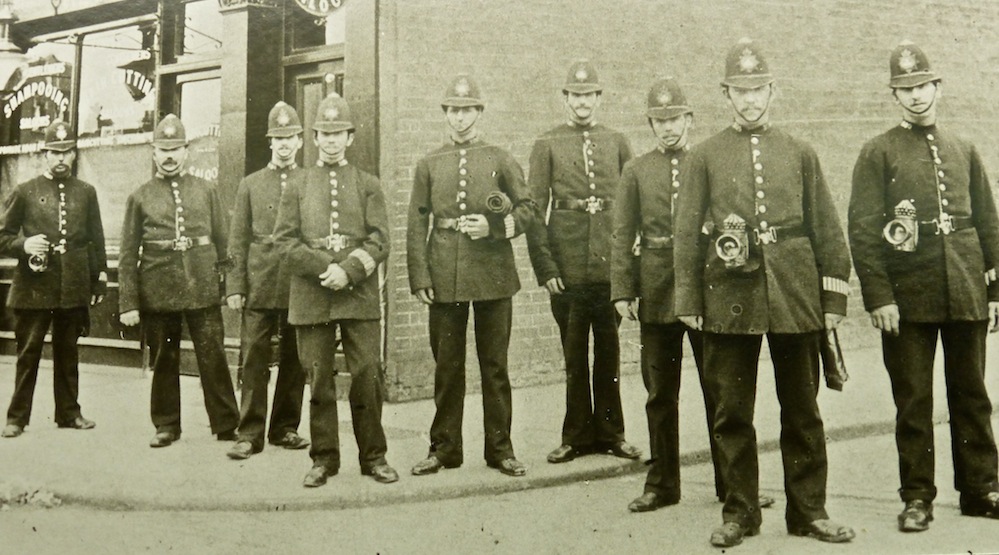
Initially I just liked this because it seemed to be a group of independent-minded M.P.s objecting to government centralising power. The more one looks into it the odder the group. M.P.s like Michael Bass, and Joshua Walmsley have a trade background, Lord Henry Lennox is the son of the Duke of Richmond, and even more oddly a government minister at the time, and John Roebuck rather magnificently just seems to object to everything.
Sir George Grey’s Police Bill has called forth a good deal of opposition from municipal authorities. On Wednesday, one hundred gentlemen, including twenty-eight Mayors and nine persons deputed by Corporations, and twenty-four Members of Parliament, met at Herbert’s Hotel, Palace Yard, to protest against the Government bill ” for securing a more efficient system of police for the counties and boroughs in England and Wales.” The Lord Mayor of York occupied the chair. The Mayors of Birmingham, Cambridge, Halifax, Rochester, Portsmouth, Southampton, Leicester, Brighton, Leeds, Sheffield, Stratford-upon-Avon, and Winchester—Mr. Roebuck,[John Arthur Roebuck (1802 – 1879) M.P for Bath 1832 -1847, then Sheffield 1849 -1879. Apparently, in general, he took up an attitude of hostility to the government of the day, of whatever party, which he retained throughout his life. In one of his pamphlets Roebuck denounced newspapers and everybody connected with them, with the result that John Black, editor of The Morning Chronicle, challenged him to a duel which was fought on 19 November 1835, but neither party was injured.] Mr. C. Forster,[later Sir Charles (1815 – 1891) Liberal M.P for Walsall 1852-1891] Mr. Bass, [Michael Thomas Bass, (1799 – 1884) was a brewer, and Liberal M.P for Derby 1848 -1883. He built the Bass Brewery into the largest brewery in the world. His obituary in the Brewers Journal said that he was known more “in the House of Commons for his regular attendance than for any feats of oratory.” His proposed legislation against organ grinders on the grounds that they were street nuisances was unsuccessful] Colonel Smyth, [ John George Smyth (1815–1869), Tory M.P for York 1847-1869, and a Colonel in the 2nd West York Militia] Lord Henry Lennox, [Lord Henry George Charles Gordon-Lennox (1821–1886), Tory M.P for Chichester 1846-1885. He held office in every Conservative government between 1852 and 1876, and was a close friend of Benjamin Disraeli.] Sir Joshua Walmsley, [see elsewhere in the blog] Members of Parliament — participated in the proceedings. The shape the objection to the measure took was that it was aggressive, encroaching, unconstitutional ; that it would create a police force that would become the tool of the Government of the day ; that it would wrest power out of the hands of the people and place it in the hands of the Government ; that it would virtually repeal the Municipal Corporation Act ; and that, if conceded, the downfall of local and municipal influence would speedily follow. The resolutions adopted accordingly characterized the bill as “subversive of local self-government,” and expressed a determination to meet it with a strenuous opposition. It was also arranged that a deputation should wait on Sir George Grey.
The deputation appointed at the meeting waited on Sir George Grey on Thursday, and stated the objections they entertain to the centralizing principle of the bill. They declined to offer any suggestion as to its amendment, and demanded its entire withdrawal. Sir George said he was obliged to them for their opinion ; he agreed with Mr. Roebuck that the House of Commons is the proper place to discuss the bill ; he could not withdraw it. On retiring, the deputation returned to Herbert’s Hotel and repeated their resolves to meet the bill with a strenuous opposition. Mr. Roebuck advised them not to make the constituencies only, but the Members, “uncomfortable.” Thus, Southampton might strongly intimate to the Attorney-General that a word from him would go far to stop the bill.
The above text was found on p.5, 23rd February 1856 in “The Spectator”